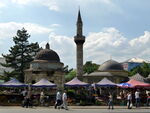Third World Conference on Inter-Religious and Inter-Civilization Dialogue in Macedonia

250 political and religious leaders from Macedonia and 25 other countries recently met in the historic center of Skopje, the capital of Macedonia. They participated in the Third World Conference on Inter-Religious and Inter-Civilization Dialogue focusing on «Freedom and Dignity - Fundamental Values». The Conference was sponsored by the Ministry of Culture of the State of Macedonia, the UNESCO and other international organizations.
The late President of Macedonia, Boris Trajkovski, who died 2004 in a crash of the presidential aircraft, initiated the World Conferences on Inter-Religious and Inter-Civilization Dialogue. Macedonia continues to struggle with its Mosaic-Society especially in the relations between Albanian Muslims and Orthodox Macedonians, and is also experiencing a critical tension around the issue of integration of Roma people in the society. The realization of the Third World Conference earmarked the 10 years since the Regional Summit of Heads of States in 2003 and the Ohrid Peace Message they issued as a first step to reconciliation and acceptance of different ethnicities, religions and cultures. The bigger frame of a World Conference always allowed the religious leaders of Macedonia and of the Balkans to meet and listen to one another.
Among the delegates were United Methodists from Macedonia as well as international Methodist representatives, among them Bishop John Schol who greeted the Conference in the name of the Council of Bishops, and the retired Bishop Heinrich Bolleter who was representing the active Bishop for the Area, Dr. Patrick Streiff. The UMC is present in several Balkan states as a Protestant minority. In Macedonia, a new generation of leaders has emerged: the President of the Church Council, Mr. Emil Zaev, and the Superintendent for the West-Balkans, Rev. Wilfried Nausner.
The Conference was organized in a way that the leaders of the religious communities were invited to present a longer statement about the theme «Freedom and Dignity – Fundamental Values in Inter-Human, Inter-Religious and Inter-Cultural Relations». Among them was also a Methodist statement delivered by Superintendent Nausner. He was pointing to the fact that values have to be developed in the families, in the fields of education and also in building up the memories in a truthful and reconciling way. The Islamic Religious Community (IVZ) boycotted the Conference referring to their struggles with the Macedonian authorities about the reconstruction of an old mosque and the return of formerly confiscated real estate.
Again there was no organized real interaction between the different religious and ethnic communities. Reading the flow of the Conference it became evident that acceptance and respect between the majorities and minorities in Macedonia have to be developed especially among the new generation.
For the first time, the President of Macedonia has invited a Youth Forum meeting alongside with the Conference. The theme was: «The Role of Religions in Building a Tolerant Youth». And it was a real dialogue between the three generations invited as participants and the President Gjorge Ivanov. The topics included: the social networks and the value systems; the role of youth and non-governmental organizations in creating value systems; experiences among young people in multi-cultural environments. The term «tolerance» was discussed as a paternalistic expression creating always a majority «tolerating» a minority. Who wants to be «tolerated»? Every person and every group is looking for acceptance and respect!
Again the World Conference issued a final declaration. The plenary had no possibility to discuss it, but – after it had been presented in the last session – adopted it. Hopefully it will be published soon on the webpage http://worldconferenceohrid.kultura.gov.mk/
Spiritual and religious values and especially the values of freedom and dignity have to be further discussed and to be transformed into practical activities in the daily life of multi-religious and multi-ethnic environments.
Source: Bishop Heinrich Bolleter
Date: May 17, 2013
